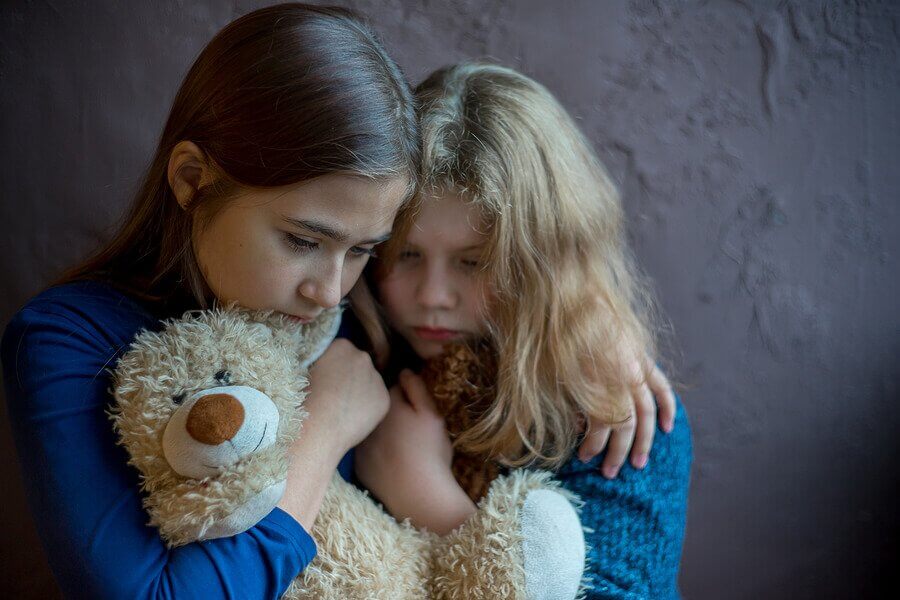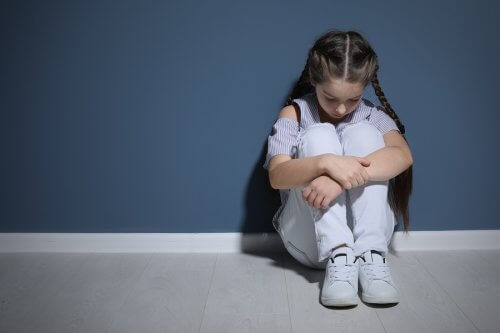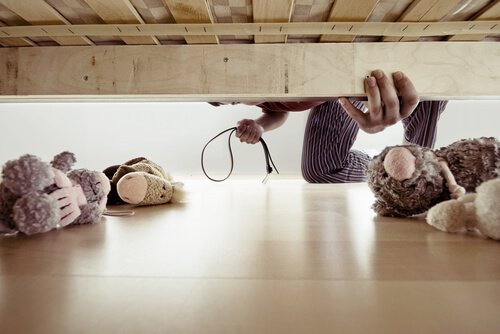The Impact of Domestic Violence on Children

In this article, we’ll tell you about the impact of domestic violence on children, a very real and serious issue.
When there is violence or mistreatment at home – among parents, children or even towards pets – children’s emotional health can be greatly impaired.
What is the impact of domestic violence on children?
Domestic or family violence is an act that puts children’s physical, emotional and psychological health at risk through blows or threats.
Children who witness beatings between their parents are also victims because they live in a household ruled by violence. And it’s not just physical aggression, but also emotional and psychological, which can be even more dangerous and harmful.
This problem affects more households than many people might imagine. In most cases, it involves the father hitting the mother and, on occasion, also the children who “‘interfere” to defend her.
However, this type of violence doesn’t differentiate between sexes, ages or social conditions.
The impact of domestic violence on children is full-blown, absolute and very difficult to reverse. The first reason is that it affects children’s evolutionary development in the short, medium and long-term.
It can even cause setbacks in their learning process. These setbacks are why there are cases of children who wet their beds, don’t speak or cannot concentrate at school.

How to identify the consequences of violence in children
Teachers, family members or friends can recognize when something is wrong in their homes due to the children’s attitude and behavior.
In addition to the signs indicated above, there are others: insomnia, enuresis, lack of appetite, anxiety, stress, depression, nightmares night and, of course, aggressiveness.
It’s very likely that children will imitate what they see on a daily basis and, when a problem arises with a schoolmate or neighbor, they’ll want to “fix” it by hitting or screaming.
Why? Because that’s what they consider the right thing to do, according to the example that they’ve been given on a daily basis.
Children who live in a household where violence is a daily occurrence are more vulnerable to trauma and emotional or psychological problems than those who live in a peaceful home.
Children are the “invisible victims” of violence
Little kids incorporate everything they see, hear and feel around them into their lives. It’s not necessary for parents to hit them or shout at them for them to become victims of what happens. Even when violence is between adults and out of children’s view, they suffer the consequences.
These kids accumulate their intense feelings of anguish inside, this can happen for years and many times over, if not treated in time. The impact of domestic violence on children can vary according to age:
1. Up to 3 years of age
They have developmental disorders, don’t eat enough, scream or get irritated easily. In addition, they experience anxiety, sadness, crying, and isolation.
Domestic or family violence is an act that puts children’s physical, emotional or psychological health at risk through blows or threats.
2. Between 3 and 7 years of age
They feel guilty about the situation which leads them to behave differently than usual.
There may be regressions in their habits: for example, they suck their fingers, wet themselves in bed or lose the ability to speak well. They can also become aggressive, rebellious, destructive, hostile and defiant.
3. Between 7 and 13 years of age
During this stage, low self-esteem becomes evident, as well as feelings of “hatred” towards the violent adult.
Also, the infant may be irritable and hit or yell at younger siblings, schoolmates, cousins or neighbors. Children feel shame for what they witness at home, and when asked, they deny everything.

4. Between 13 and 18 years old
During adolescence, the main repercussion is related to their emotions and the formation of their personality. They can develop criminal behaviors, such as stealing or fighting on the street, and can also start using drugs or drinking alcohol excessively.
As you can see, the impact of domestic violence on children goes beyond what they see or hear at home. This unfortunate situation can change the way they solve problems and relate to those around them throughout the rest of their lives.
All cited sources were thoroughly reviewed by our team to ensure their quality, reliability, currency, and validity. The bibliography of this article was considered reliable and of academic or scientific accuracy.
- Patró. (2005). Víctimas de violencia familiar: Consecuencias psicológicas en hijos de mujeres maltratadas. Anales de Psicología. https://revistas.um.es/analesps/article/view/27071
- Sala Musach, I., Hernandez Alonso, A. R., Ros Guitart, R., Lorenz Castañe, G., & Parellada Esquius, N. (2010). Violencia doméstica: Preguntar para detectar. Atencion Primaria. https://www.sciencedirect.com/science/article/pii/S0212656709002984
- Amar Amar, J. J., Kotliarenko, M. A., & Abello Llanos, R. (2010). Factores psicosociales asociados con la resiliencia en niños colombianos víctimas de violencia intrafamiliar. Investigación & desarrollo, 11(1). http://rcientificas.uninorte.edu.co/index.php/investigacion/article/viewFile/1134/710
- Amar Amar, J., & Berdugo de Gómez, M. (2011). Vínculos de apego en niños víctimas de la violencia intrafamiliar. Psicología desde el Caribe, 1-22. http://rcientificas.uninorte.edu.co/index.php/psicologia/article/view/2076
- Muñiz Ferrer, M. C., Jiménez García, Y., Ferrer Marrero, D., González Pérez, J., & Rondón García, I. (1996). Sobre la percepción de la violencia intrafamiliar por los niños. Revista Cubana de Medicina General Integral, 12(2), 126-131. http://scielo.sld.cu/scielo.php?pid=S0864-21251996000200003&script=sci_arttext&tlng=pt
- Almenares Aleaga, M., Louro Bernal, I., & Ortiz Gómez, M. T. (1999). Comportamiento de la violencia intrafamiliar. Revista cubana de Medicina general Integral, 15, 285-292. http://scielo.sld.cu/scielo.php?script=sci_arttext&pid=S0864-21251999000300011